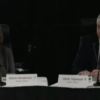(This article was originally published by The Lawfare Project on July 7, 2016. David B. Harris is a member of the Mackenzie Institute’s Advisory Board. It has been republished with permission from The Lawfare Project.)
Former ISNA President Ingrid Mattson Claimed Reputation Damaged by “Radical” Label, but Gave Up on Own Defamation Lawsuit
Backed by The Lawfare Project, Leading Counter-Terrorism Expert Refused to Make Concessions; No Damages, Costs, or Apology
A hallmark Islamist libel lawfare lawsuit has collapsed following more than a year of legal action supported by The Lawfare Project.
Dr. Ingrid Mattson, former longstanding senior functionary of the Islamic Society of North America (ISNA), launched her proceeding – judged meritless by The Lawfare Project – against David B. Harris, a lawyer and one of Canada’s leading terrorism experts. But Harris, a recent witness before the U.S. Senate Homeland Security Committee, never relented in his refusal to withdraw a public characterization of Mattson as “radical,” nor would he offer apologies, damages, or costs. This forced Mattson, likely fearing what a full legal-disclosure process would reveal, to give up all her demands. In a stunning reversal, and despite her claim of grave reputational damage, Mattson recently agreed to have the Superior Court of Ontario dismiss her own suit.
The lawsuit stemmed from an October 11, 2014 Canadian radio broadcast in which national talk show host Roy Green interviewed together the distinguished President of the American Islamic Forum for Democracy, Dr. M. Zuhdi Jasser, and Harris, Director of INSIGNIS Strategic Research Inc.’s Intelligence Program. The interview focused on the growing threat of Canadian terrorist “travelers” migrating to join Islamic State and other terrorist fighters abroad, and the risk of their return to the West. There was also discussion about how, in the United States, Canada, and other Western jurisdictions, political correctness and other variants of self-censorship and official censorship combine to undermine public awareness, security, and public-policy development with respect to Islamist threats of both the overtly violent and “soft-jihadi” Muslim Brotherhood-supremacist kinds.
During the interview, Dr. Jasser used the term “pro-Islamist” to describe Dr. Mattson, the radical Council on American-Islamic Relations (CAIR), and problematic clerics Zaid Shakir and Siraj Wahhaj. Jasser was noting that an ostensible “counter-radicalization handbook,” United Against Terrorism, had been produced by the National Council of Canadian Muslims (NCCM) – originally founded as the Canadian chapter of the Islamist entity, CAIR – and the Islamic Social Services Association (ISSA). Dr. Jasser objected to the arresting fact that the handbook recommended Mattson, and others who had been condemned as radicals, as reliable sources of counter-radicalization information. Harris summarized Jasser’s concern by speaking of the “problem of commending radicals like Dr. Ingrid Mattson and Siraj Wahhaj, as experts or Islamic scholars of use in counter-radicalization.” It seems primarily for this use of the word “radical” that Harris was sued by Mattson in the suit she has now surrendered.
Dr. Mattson was the Islamic Society of North America’s president when her organization was designated an unindicted co-conspirator in the successful Holy Land Foundationprosecution, which involved allegations of the funding of Hamas, the U.S.- and Canadian-designated terrorist organization. Although neither Mattson nor ISNA were charged in the matter, Mattson’s extensive, longstanding connections with disturbing Islamist individuals and entities, like ISNA and the International Institute of Islamic Thought (IIIT), have been a source of dismay for counter-terrorism specialists and moderate Muslims alike. Mattson occupies the radical-funded London and Windsor Community Chair in Islamic Studies at Huron University College (HUC), Ontario, an affiliate of the University of Western Ontario. Both the creation of the Chair, and Mattson’s appointment to it, caused an uproar. As Winfield Myers wrote in American Thinker at the time of Mattson’s 2011 HUC appointment:
The move validates widespread concern, as revealed in this Campus Watch article by Canadian journalist Barbara Kay and a letter from concerned faculty and friends at HUC, both published in May, that the support of several Islamist groups in funding the chair would lead to the appointment of a radical Islamist as the first holder. In Ingrid Mattson, the funders’ wishes have been fulfilled.
Officials, media, and others wishing, for due diligence and other purposes, to know more about Dr. Mattson and her associates, should refer to the Harris defense team’s Mattson v. Harris Statement of Defence. This document provides a comprehensive list of references (Statement of Defence, commencing p. 12) credibly supporting Harris’s interview position. Reference should also be made to Harris’s important 2013 article, Being Had for Dinner in Ottawa. Dr. Mattson brought no legal challenge against Harris with regard to this revealing piece.=
The Mattson lawsuit’s outcome is a victory for both free speech and The Lawfare Project, which provided financial and other support for Harris’s defense, via the Project’s Legal Fund.
As Brooke Goldstein, Director of The Lawfare Project, stated, “The unjustifiable nature of Mattson’s lawsuit is revealed by her willingness to drop the litigation, at an advanced stage, with no payout or apology from Harris, in spite of the alleged gravity of her claims. As The Lawfare Project has noted countless times, the filing of predatory, groundless defamation suits is a frequent lawfare tactic, aimed at silencing and punishing speech on issues of national security. Such unacceptable actions are readily distinguishable from competently managed libel proceedings, filed in good faith to defend people’s reputations. Human rights defenders and attorneys’ governing bodies must take note – and action.”
“Those familiar with efforts to quieten informed debate about Islamist extremism and terrorism can only be grateful for the existence of The Lawfare Project,” said David Harris. “From the beginning of the recent Mattson lawsuit until its ultimate collapse, Lawfare Project Director Brooke Goldstein and her highly professional staff of attorneys were unflinching in their determination to achieve a just result. Their commitment was no surprise to those of us who had seen them in vigorous action across the years.”
“Mainstream Muslims in Canada and the United States join their fellow citizens in saluting The Lawfare Project’s sterling effort to defend constitutional free expression and advance the cause of justice,” declared Mrs. Raheel Raza, President of the Council for Muslims Facing Tomorrow and an internationally acclaimed human rights advocate. “The successful Harris defense marks yet another victory for The Lawfare Project, and should be a source of pride and reassurance to all who are committed to moderation, liberty, and equality.” David Harris expressed his gratitude for the MFT’s encouragement and assistance throughout theMattson matter.
This outcome invites further questions. U.S. government outreach has at times involved placing those with Muslim Brotherhood or other unsatisfactory ideological connections or inclinations on government advisory boards. Mattson’s past, brief stints on a White House “interfaith taskforce” and Department of Homeland Security faith-based advisory council, as well as her connection to the military chaplaincy program, point to an urgent need to revisit due-diligence standards applicable to government appointments. The same can be said of Canada, where analogous controversies have emerged.
Harris was previously targeted for silencing in another failed Islamist libel lawfare suit. The Canadian Council on American-Islamic Relations (CAIR-CAN) – renamed in 2013 the National Council of Canadian Muslims (NCCM) – and its founding Chair, Dr. Sheema Khan, launched the libel action in 2004. This was in response to Harris’s asking in a radio interview whether CAIR-CAN/NCCM was linked to the U.S.-based, Saudi-funded Council on American-Islamic Relations (CAIR). At the time, several former CAIR officials and affiliated persons, including CAIR’s national civil liberties coordinator, had been sentenced to prison following terror-related convictions. CAIR would later become another unindicted co-conspirator in the Holy Land Foundation case, and, in 2014, be designated a terrorist group by the United Arab Emirates on a list including such groups as al-Qaeda, ISIS, and Boko Haram. CAIR-CAN/NCCM’s identity as the Canadian chapter of CAIR was ultimately put beyond doubt by discovery of a sworn 2003 court affidavit of Dr. Khan, in a separate proceeding. It is believed by many that the reason for CAIR-CAN’s 2013 name-change to NCCM was to hide its CAIR origins and possible continuing financial or other connections. To the best of The Lawfare Project’s knowledge, CAIR-CAN/NCCM and Dr. Sheema Khan have yet to condemn, publicly and by name, CAIR and all of those CAIR-related persons who have been convicted on the basis of terrorism-related charges.
Harris’s successful 2004-to-2006 legal combat with CAIR-CAN/NCCM was part of the North America-wide CAIR/CAIR-CAN libel lawfare “silencing” offensive of the period. As Harristestified before Canada’s House of Commons Standing Committee on Public Safety and National Security, this offensive backfired on CAIR/CAIR-CAN’s pretensions of being a human rights organization, and seems to have caused CAIR-CAN/NCCM to leave the libel lawfare field for a few years. In any event, Harris, who has said he believes there is a place for good faith, meritorious use of libel law, emerged victorious from that 2006 litigation: no withdrawal, no apology, no payment, no confidentiality agreement. Subsequently, in 2014, NCCM/CAIR-CAN sued then-Canadian Prime Minister Stephen Harper and his communications director for a statement in which the latter seemed to link NCCM/CAIR-CAN to Hamas, a Canadian-banned terrorist group. In what some regarded as a setback for NCCM/CAIR-CAN, a Canadian court in the Harper case in December ordered the Islamist group to produce further documents bearing on the organization’s relationship with CAIR and other troubling entities, including the Muslim Association of Canada (MAC).
Canadian lawyer Jeff G. Saikaley represented Mattson in the recent, failed action against Harris, and has been representing NCCM/CAIR-CAN in its controversial suit against Mr. Harper et al.
Summarizing the broader context, Harris remarked, “There is a reason why freedom of speech is often called ‘the first freedom.’ Without it, free citizens cannot fully and openly examine, debate, and shape their present and future.”
“In this era of terrorism and other national security challenges, constitutionally inappropriate inhibitions on this freedom – whether through government imposition, private machinations, personal self-censoring, or otherwise – undermine our capacity responsibly and efficiently to identify, define, and confront domestic and foreign threats.”
In light of escalating radicalism, extremism. and terrorist violence in the United States, Canada, Europe, and elsewhere, Harris’s message is more significant than ever. It is of paramount importance that we defend and protect the free speech rights of our counter-terrorism communities, including the many moderate Muslim voices who resist radicalism and join others in offering responsible warnings about the threat of ideological extremism and terror.
Please consider supporting The Lawfare Project, which financially supports the litigation fees and court costs of those resisting lawfare.








